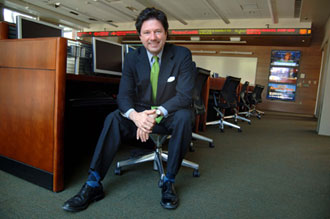No Need to Panic
As Federal Reserve Chairman Ben Bernanke recently cut a key interest rate again to stave off further economic panic in this country, doomsday pundits were using words like recession and making references to the Great Depression. Meanwhile, Tulane business professor Peter Ricchiuti went on television with his message about the economy: it's not as bad as you think.

Peter Ricchiuti, a clinical professor in the A. B. Freeman School of Business at Tulane, believes the American economic downturn will be less severe than anticipated. (Photo by Paula Burch-Celentano)
A recession is defined as a period of negative economic growth for two consecutive quarters something Ricchiuti says we haven't seen this decade.
"Technically, we are not even in a recession," says Ricchiuti, a clinical professor in the A. B. Freeman School of Business at Tulane. "There are parts of the economy that are holding up. Exports are up by 15 to 20 percent a year."
Ricchiuti says he expects exports to continue to increase as long as the Fed continues to cut interest rates, which weakens the U.S. dollar, thus giving businesses abroad more buying power.
An increase in exports bodes well for the New Orleans, one of the world's largest ports. And the port might not be the only side of the local economy to get a boost.
As area residents struggle to rebuild their homes, construction in other parts of the country is coming to a grinding halt in the wake of the sub-prime mortgage meltdown. This leaves a lot of builders with time on their hands, and a large pool of work to be done here.
"A lot of builders are saying: 'Louisiana is the place to come,'" Ricchiuti says. He adds that the cost of materials and labor may see a reduction nationwide, making it cheaper to build anew or repair a storm damaged home.
"It makes total sense; there is a glut of building materials and a glut of workers [nationally]. We could get the benefits of a national slowdown."
Add to that the fact that the region is seeing an increase in sales and property taxes, and that the New Orleans bond rating is up, and one might assume that the Crescent City is set to buck a national trend.
"The New Orleans economy is somewhat counter-cyclical," Ricchiuti says. "Sometimes it feels like we're living on Pluto."
But not all the news is good for New Orleans. Mainstay industries like tourism and the convention business would be set to "take it on the chin if the nation experienced an economic decline," Ricchiuti says.
"Historically, corporations have been quick to take money away from conference budgets. If it were a significant downturn you might see companies shorten conferences or invite fewer participants."
While the slew of television pundits claiming the economy is already in a recession may be good for ratings, Ricchiuti says they may not be correct. The news from the housing market is better than expected, posting a 2.9 percent increase in February. Ricchiuti believes this is further evidence the economic downturn will be less severe than anticipated.
